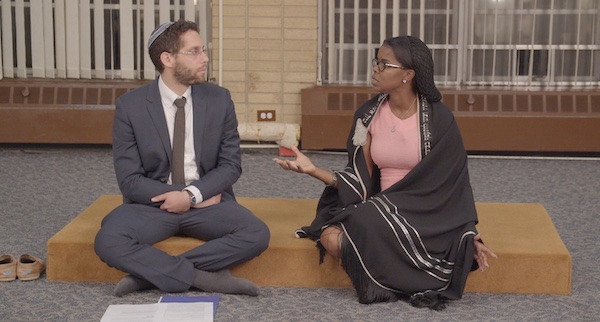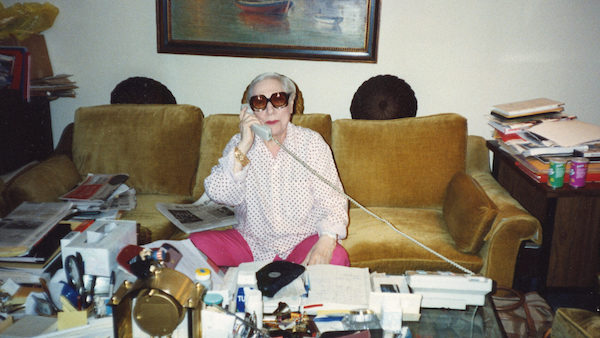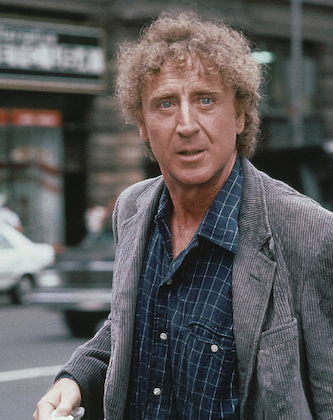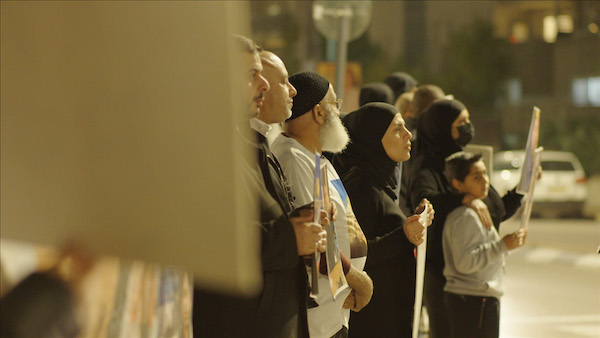Doc Talk: Jewish Values Celebrated in This Year’s Boston Jewish Film Festival
By Peter Keough
In a time of outrage and grief, a trio of documentaries at the BJFF serve as a reminder of the traditional Jewish values of compassion and inclusion, reaffirming the power of activism, art, and simple acts of human kindness.
As the crisis in Israel rages following Hamas’ heinous terrorist attack, it might be worthwhile to watch these three documentaries (and a fourth, which has unfortunately been withdrawn) at the Boston Jewish Film Festival. In a time of outrage and grief they serve as a reminder of the traditional Jewish values of compassion and inclusion and reaffirm the power of activism, art, and simple acts of human kindness.

A scene from Rabbi on the Block. Photo: BJFF
Those are the qualities that drew Rabbi Tamar Manasseh to Judaism. At the start of Brad Rothschild’s engaging if discursive Rabbi on the Block, she relates how she is tired of people asking her how she, a Black woman from the South Side of Chicago, could be a Jew. It implies, she says, doubts as to whether or not she qualifies as such because of her race. (The film screens November 7 at 7 p.m. at the West Newton Cinema followed by a Q&A with the director and the film subject Rabbi Tamar Manasseh, moderated by Maria Isabel Rosario, Social Justice Educator at The Rashi School)
However, for those who insist, she explains how her beloved uncle had a calling to the faith and became a member of Chicago’s Beth Shalom B’nai Zaken Ethiopian Hebrew Congregation. As a child Manasseh also became a member and her uncle encouraged her to attend a private Jewish school. There she was stirred by the teachings of Judaism, especially those that called for believers to work for the common good and to confront social problems and solve them. And so she decided to become a rabbi.
That proved a struggle — not because of her race, but her gender. The Israelite Board of Rabbis with which her congregation is affiliated dragged their feet for years before ordaining her in 2021. In the meantime she brought her faith into the street — the corner of 75th and South Stewart Avenue in the crime-ridden Englewood neighborhood to be exact — and formed the group Mothers and Men Against Senseless Killings (MASK), a community outreach organization credited with reducing local violence.
In the film she is seen setting up their annual Yom Kippur observance with Yahrzeit candles representing the hundreds of victims of gun violence from the past year. Later, at Christmas, she leads scores of volunteers delivering presents to needy kids. “What the world sees as problems, Jews see as cracks,” she says. “You get your spackle, you get your spackle knife, and you go to work.”

A scene from Queen of the Deuce. Photo: BJFF
Unlike Rabbi Manasseh, Chelly Wilson in Valerie Kontakos’s entertaining and insightful Queen of the Deuce (2022) may not have actively practiced her Judaism, but she embodied its principles of resilience, resourcefulness, and generosity. (The film screens November 4 at 7 p.m. at the JCC Riemer-Goldstein Theater followed by a Q&A with executive producers and film subjects Bondi Wilson Walters and Don Walters moderated by BJF Artistic Director Lisa Gossels; it is also available online beginning November 13).
Born in Thessaloniki, Greece, Wilson presciently emigrated before the Nazis invaded (45,000 of the city’s 50,000 Jews would perish in the Holocaust) and ended up in New York City where she embraced the freewheeling entrepreneurial spirit of her adopted hometown.
And then some — she bought up a line of movie theaters near Times Square, converted them to softcore in the 60s, then hardcore, and eventually gay porn in the 1970s. She even ventured into producing her own movies with a company run by her daughter, Bondi Wilson Walters, until they were prosecuted for obscenity (Walters was acquitted because, she says, she giggled uncontrollably on the witness stand).
Just your regular mom and pop enterprise, with grandma inviting the family over for the holidays to her apartment above one of her raunchier establishments. It is reminiscent of the family-run pornographic bookstore in Rachel Mason’s 2019 Circus of Books. “She was Jewish [and] celebrated Christmas in a porn theater,” recalls Wilson’s grandson. “It doesn’t get weirder than that.”
In fact, though, it does. Like Wilson losing and winning fortunes in all-night poker games with local mafiosi in her den. Or, much to the surprise of her family, the late revelation that she was gay. As endearing as such details are, Wilson’s greatest legacy includes succeeding as a woman in a man’s world and quietly helping others. Her good deeds ranged from organizing shipments of urgently needed goods to postwar Greece to offering her grandson a Manhattan apartment building — which, to his later regret, he declined.

A scene from Remembering Gene Wilder.
The word most frequently associated with the late comic actor and filmmaker Gene Wilder in Ron Frank and Glenn Kirschbaum’s conventional but irresistible Remembering Gene Wilder (2023 is “innocent.” (It screens November 1 at 7 p.m. at the Coolidge Corner Theatre and November 6 at 7 p.m. at Orchard Cove. Introduced by executive producer Julie Nimoy and followed by a Q&A with the directors moderated by Boston Jewish Film Artistic Director Lisa Gossels).
Wilder’s longtime friend and collaborator Mel Brooks extols that quality when he recalls why he cast him as Leopold Bloom (a nod to another naif, the hero of Joyce’s Ulysses) in his hilarious, transgressive The Producers (1967). Perhaps it was that deceptive sweetness that allowed them to get away with the outrageous musical-within-the movie Springtime for Hitler. This aura of innocence also injected ambiguity and absurdity into his performances as the megalomaniacal mad scientist in Brooks’s Young Frankenstein (1974), as the sweet-natured but possibly sociopathic title impresario in Mel Stuart’s Willy Wonka & the Chocolate Factory (1971), and many others.
Frank and Kirschbaum combine testimonials and anecdotes from Brooks and other friends, family members, collaborators, and film experts along with excerpts of Wilder relating the story of his life in the audiobook of his 2006 memoir Kiss Me Like A Stranger: My Search for Love and Art. All of which is compelling, informative, and moving — especially when the topic is the Alzheimer’s which ultimately claimed Wilder’s life in 2016 at 83. But the generous clips from his many movies make this a must-see, plus such tidbits as the fact that Brooks decided not to cut the “Puttin’ on the Ritz” song-and-dance sequence in Young Frankenstein only because Wilder insisted on keeping it in. For that alone he deserves cinematic immortality.
Sadly, Israeli filmmaker Hilla Medalia’s Mourning in Lod (2023), which was originally scheduled to appear in the festival, has been withdrawn by the board of directors because of the current crisis. This omission seems another example — along with the Boston Palestine Film Festival cancelling the in-person portion of their program and ArtsEmerson pulling their screening of the film Israelism — of the impact that the war has had on local (and national) cultural events.
In Medalia’s film the Israeli town of the title is one of eight so-called “mixed cities” where Jewish and Arab citizens live together in mostly peaceful coexistence. That changed in 2021 when Musa Hassuna, a 32-year-old Palestinian husband and father, was shot and killed during demonstrations protesting the then ongoing Israeli air assault on the Gaza Strip. More demonstrations broke out when the five Israelis arrested for the killing were released. Caught in these violent protests was Yigal Yehoshua, a Jewish resident, who was struck by a rock while driving his car. He died of his injuries.
A reprise of the rounds of violence and vengeance that has marked Israeli and Palestinian relations until the present day seemed likely to explode. But then something remarkable happened. Yehoshua’s family chose to donate his organs. One of the recipients was Randa Aweis, a 58-year-old Christian Arab in East Jerusalem suffering from kidney disease. This was one cycle of murderous revenge that would culminate in a life-giving act of mercy.

A scene from Mourning in Lod. Photo: San Francisco Jewish Film Festival
Medalia relates the story with compassion and canny detail, visiting each family in turn as they share their experiences. Their passage from grief and anger to a kind of reconciliation is fraught but fulfilling and it would be wonderful to report that it carried over to the community at large. However, whatever individual transformations these events inspired, they had no apparent impact on the justice system — as the film’s epilogue points out, the seven Arab suspects in the Yehoshua killing have been in custody awaiting trial since May 2021. And no charges have been filed in the murder of Hassuna “[d]espite allegations of obstruction of justice as a result of political intervention.”
Commenting on the festival’s decision not to include Mourning in Lod in its program, Boston Jewish Film Board President Ken Shulman said in a statement, “Due to the sensitive nature of this beautiful film, and to the extremely volatile political climate in which we live, we thought it prudent to postpone this screening.”
He also noted, “I’m sorry that they [the Boston Palestine Film Festival] were compelled to cancel the in-person part of their festival because of outside pressure.”
The Boston Jewish Film Festival takes place at the Coolidge Corner Theatre, the Brattle Theatre, The West Newton Cinema, and other venues November 1-12 and online November 13-15.
[Editor’s Note: I viewed Mourning in Lod and agree with Ken Shulman that it is a beautiful film, its depiction of a mercilessly difficult situation meticulously even-handed. For me, the documentary’s celebration of acts of humanity — as well as its concern for justice for all involved — makes this just the kind of film that should be seen now. — Bill Marx]
Ed Symkus filed a preview of this year’s BJFF.
Peter Keough writes about film and other topics and has contributed to numerous publications. He had been the film editor of the Boston Phoenix from 1989 to its demise in 2013 and has edited three books on film, most recently For Kids of All Ages: The National Society of Film Critics on Children’s Movies (Rowman & Littlefield, 2019).
